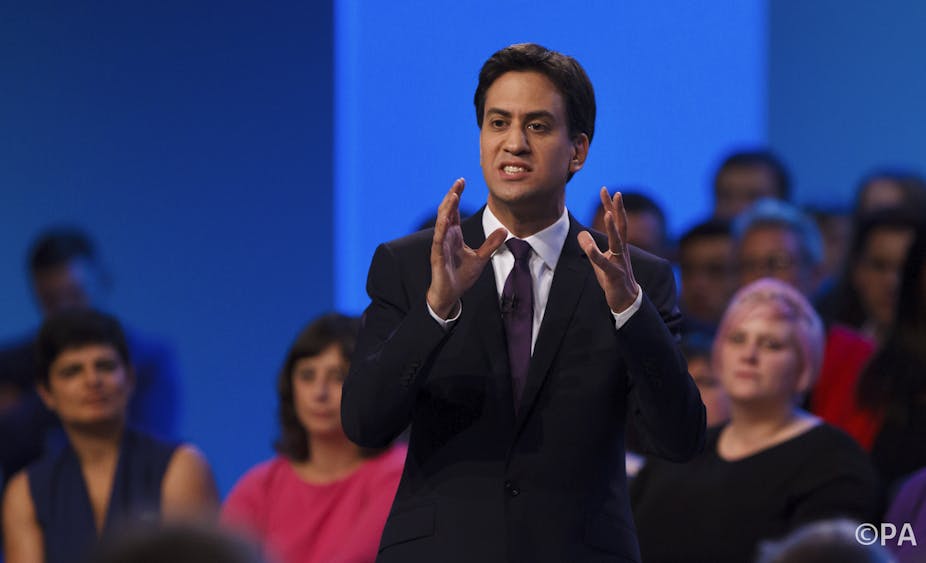In his Labour Party conference speech, Ed Miliband planted himself firmly on the left. His big themes of confiscating land from greedy developers, controlling energy prices and imposing a higher minimum wage, have left commentators in near unanimity on that point.
Predictably, The Daily Mail raised the spectre of a return to the “bad old days of 1970s-style socialism”. The Telegraph warned that individual property rights would no longer be safe. No less predictably, the Daily Mirror and The Guardian hailed the rise of “Red Ed”, brought to us to save the nationalised NHS from Conservative-Liberal privatisation.
However, these caricatures overlook Miliband’s overarching vision – the notion of “reciprocal responsibility”, where everybody acts on the mutual obligations we owe to one another. He seeks to renew and extend long-lost British traditions that stress virtuous practices of solidarity. These traditions include the One Nation conservatism of Benjamin Disraeli and the cooperative movement that gave rise to Labour before the statist socialism of the Fabians prevailed.
Common to both traditions is a rejection of the laissez-faire capitalism that led to the depression of 1873-96. This is a better historical analogy than the crisis of 1929-32, which, after all, was followed by a strong recovery – not the slowest one in a century that we are currently witnessing. Each year between 1933 and 1936, growth exceeded 4% of national output – a performance greatly helped by a massive house building programme, with nearly 300,000 new homes built annually. Many of these are the well-known 1930s semi-detached houses that we find in London and across the south.
Coalition failure
It’s worth mentioning all this because the Coalition has failed to learn the lessons from history. Various flagship initiatives like George Osborne’s funding for lending will merely fuel the growing property bubble. Miliband is right to tackle head-on the speculative practices of certain developers that inflate prices and reduce the available land for much-needed house building.
This, coupled with lower taxes for small - and medium-sized enterprise (paid for by cancelling the Coalition’s cut in corporation tax for 80,000 big companies), makes Miliband pro-, not anti-business – a far cry from 1970s-style state socialism.
Crucially, he seeks to break the complicit collusion between “big government” and “big business”, which Thatcherism inaugurated and New Labour intensified. The post-1979 model has focused on how the state can extend the reach of the market into the public sector and the private sphere – opening up education, transport, health and the family to the forces of the “market-state”.
Consistent critique
Like 19th-century laissez-faire capitalism, the economic liberalism that has dominated since the 1980s combines a strong state with a free market. Taken together, state control and market commodification have left society ever more atomised.
From the outset of his leadership, Miliband has been consistent in his critique of corporate capitalism. In 2011, he surprised his party and the country by denouncing the predatory practices that have created a new oligarchy of multinational corporations – chief of all Rupert Murdoch’s empire. The oligopolistic rip-off extends to banking, energy and many other sectors. Hence Miliband’s promise to freeze energy prices for 20 months if Labour wins the next general election.
Miliband’s proposed cap on energy prices will not just provide a much-needed relief for the “squeezed middle”. More importantly, it will help transform the energy market by changing the incentive structure.
So far, the big six energy companies, which control more than 95% of the market between them, were able to keep out new competitors by a lack of pricing transparency for customers and long-term contracts to supply businesses. Freezing prices will help smaller competitors to enter the market and increase competition.
Share and share alike
In short, Miliband is breaking away from the Old Labour policy of nationalisation and the New Labour, neo-Thatcherite policy of privatisation in favour of mutualisation. But what does that mean?
Economically, Miliband makes the point that the old model of trickle-down growth is bankrupt. In his best line yesterday, he said “They used to say a rising tide lifts all boats. Now the rising tide just seems to lift the yachts”. Thus the task is to connect private profit to public benefit. His call for a “global race to the top” exemplifies this: more investment and innovation raise competitiveness through productivity gains, which allows for higher wages. In short, a virtuous cycle.
Mutualist vision
Politically, Miliband’s mutualist vision translates into civic participation in politics – whether through individual membership of the Labour party, lowering the voting age to 16 or by building new institutions.
Socially, the emphasis on reciprocity underpins more state support for childcare and the integration of social care into an expanded NHS.
Crucially, the role of the state is not replace or destroy the market but rather to create the conditions for real competition (for example in energy or house-building) and to be the guarantor of the common good – a politics in which each has a stake and is rewarded for their contribution. This can take the form of either working and paying tax or by getting involved in the local community – caring for the vulnerable, helping in schools or safeguarding the environment.
Far from being a variant of top-down state socialism that deprives people of their individual freedoms, Miliband’s vision stresses the mutual obligations that both rights and contracts encompass.

